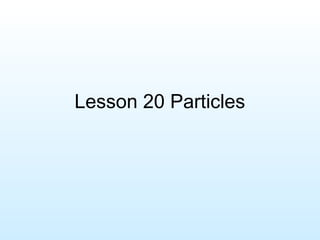Lesson 20 particles ppt
•Download as PPT, PDF•
1 like•481 views
Ni particles signify action that takes place 'in', 'to', 'at', or the 'place' of something. For example, "ni modoru" means "to return to". When turning a corner in a certain direction, the corner is marked with "o" and the direction with "ni". 'O' and 'ga' particles can be confusing to differentiate. 'Ga' emphasizes a specific sound is audible. 'O' follows a preceding noun, like a person being kept waiting. When exchanging two nouns, 'to' connects them and 'o' is used. Merchandise is returned, with 'o' particle preceding the verb to return it.
Report
Share
Report
Share

Recommended
Basic sentence patterns

This is a presentation I made for a demonstration teaching, so you may find the first few slides
Recommended
Basic sentence patterns

This is a presentation I made for a demonstration teaching, so you may find the first few slides
Transitive and Intransitive verbs

A transitive verb is a verb that requires an object to receive the action. An intransitive verb does not take an object. Using an object immediately after an intransitive verb will create an incorrect sentence. However, there may be other information after the verb, such as one or more prepositional phrases or an adverb. In this Power Point Presentation I clearly discussed about the Transitive and Intransitive verbs. Please make use of this Power Point Presentation for your reference purpose.
Voice change bengali+ english

It is very useful for the weak students of Bangladesh. voice changing has been described in bengali and English language.
by sharif uddin
How to learn transitive and intransitive verb

transitive and intransitive verb is essential to make a correct sentence. without the knowledge of these two verbs, the learners cannot make a correct sentence. This slide describe it in nice way to make reader understand easily.
More Related Content
What's hot
Transitive and Intransitive verbs

A transitive verb is a verb that requires an object to receive the action. An intransitive verb does not take an object. Using an object immediately after an intransitive verb will create an incorrect sentence. However, there may be other information after the verb, such as one or more prepositional phrases or an adverb. In this Power Point Presentation I clearly discussed about the Transitive and Intransitive verbs. Please make use of this Power Point Presentation for your reference purpose.
Voice change bengali+ english

It is very useful for the weak students of Bangladesh. voice changing has been described in bengali and English language.
by sharif uddin
How to learn transitive and intransitive verb

transitive and intransitive verb is essential to make a correct sentence. without the knowledge of these two verbs, the learners cannot make a correct sentence. This slide describe it in nice way to make reader understand easily.
What's hot (20)
Viewers also liked
Taking the Brixton Pound to the next level

The product of the hard graft of the Made In Lambeth team. Visit www.madein.lambeth.coop
Relaunching Vauxhall City Farm

Deck outlining 'Animal Heroes' campaign created for Vauxhall City Farm by Made In Lambeth
Utilization of Hydrogen Fuels for IC Engines by Prof. L. M. Das IIT Delhi

This ppt gives a insight of use of Hydrogen fuels to reduce emissions in IC Engines
Viewers also liked (12)
Assistive technology for young children in special education

Assistive technology for young children in special education
Utilization of Hydrogen Fuels for IC Engines by Prof. L. M. Das IIT Delhi

Utilization of Hydrogen Fuels for IC Engines by Prof. L. M. Das IIT Delhi
290711169 livro-de-matematica-alvaro-andrini-6-ano-pdf

290711169 livro-de-matematica-alvaro-andrini-6-ano-pdf
Similar to Lesson 20 particles ppt
Sentences.pptx

To develop fluency and bring variety in writing style, one must learn sentence structures.
Similar to Lesson 20 particles ppt (20)
Lesson 20 particles ppt
- 2. Ni particles • Ni particles are pretty straight forward when it comes to verbs. It is an particle that signifies action that takes place ‘in’ something, ‘to’ something, ‘at’ something or ‘place’ of something. 〜にもどる ~ ni modoru to return; to come back ‘ni modoru’ is pretty straight forward as it is just like english. To return to/ back to. (corner) を (direction) に まがる (corner) o (direction) ni magaru: to turn ‘o’ follows the obect in which case is the corner and then turning to the direction we use the ‘ni’ adjective before the verb.
- 3. ‘o’ and ‘ga’ particles • These two types of particles are what I find most confusing to differentiate, mostly because as you learn more grammer structures these two particles become exchangeable. • がきこえる ga kikoeru: to be audible ‘ga’ is used because it emphasis that that certain sound is audible and not anything else. • 〜をまたせる ~ o mataseru to keep someone waiting ‘o’ particle is preeceeded by a noun so in this case, the person that was kept waiting. • ( x )と ( y )をこうかする (x) to (y) o kouka suru to exchange (x) and (y) the ‘to’ particle means ‘and’, two nouns(items) are exchaged so a use of ‘o’ is needed.
- 4. • 〜を へんぴんする ~ o henpin suru to return (merchandise) the mechendise is a noun so we use the ‘o’ particle henpinsuru.